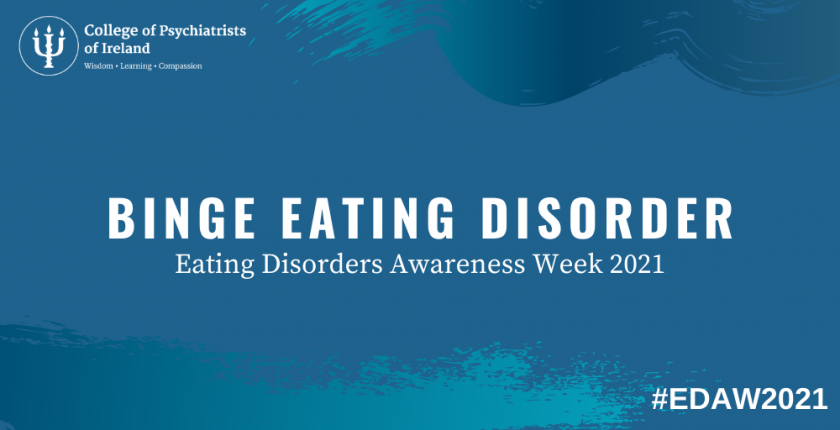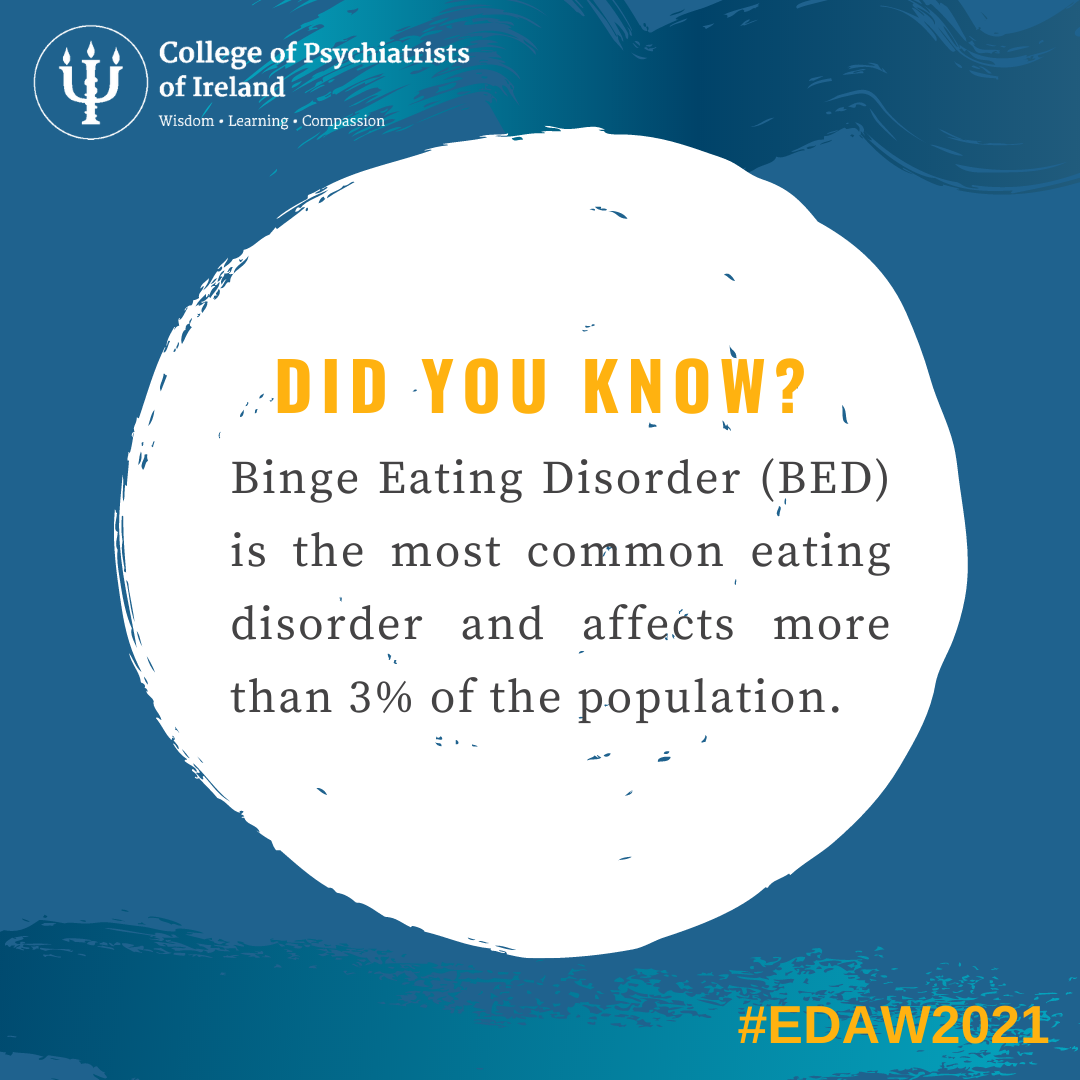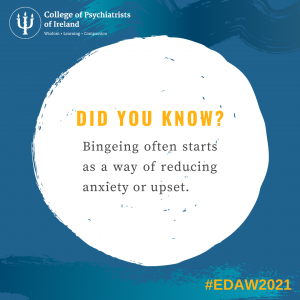Blog
Binge Eating Disorder: Eating Disorders Awareness Week 2021
- March 2, 2021
- Category: Blog Of interest from media

Binge Eating Disorder (BED) is the theme for this year’s Eating Disorder Awareness Week, taking place from the 1st to the 7th of March.
 Dr Caroline Maher, Co-Chair of the College Special Interest Group on Eating Disorders, provides some key information on the diagnosis and treatment of what is the most common eating disorder.
Dr Caroline Maher, Co-Chair of the College Special Interest Group on Eating Disorders, provides some key information on the diagnosis and treatment of what is the most common eating disorder.
Introduction
Binge Eating Disorder (BED) is the most common eating disorder and affects more than 3% of the population.
Women are most commonly affected at a ratio of 2:1.
The age of onset is most usually in late adolescence to early adulthood.
Diagnosis and clinical features
The core characteristics used to diagnose BED include:
- Eating a larger amount of food than others would over a discrete time period (e.g. 2 hours) on average at least once a week for 3 months.
- A feeling of loss of control of eating during these episodes (‘binges’)
- Marked distress
In addition to the above, 3 + of the following:
- Very rapid eating
- Eating until uncomfortably full
- Eating even though they don’t feel hungry
- Eating along because of embarrassment
- Disgust, depression or guilt after bingeing
There is marked distress attached to the behaviours. BED is different from Bulimia Nervosa in that there are no other specific weight loss behaviours like vomiting, using laxatives or diet pills or over-exercise. However, often people will restrict or diet following bingeing due to the feelings of guilt and shame. This leads to hunger and more bingeing, and so a cycle of binge/guilt/restrict/binge occurs which can be difficult to break without help.
 Bingeing often starts as a way of reducing anxiety or upset. Anxiety reduction happens in a few ways. The high sugar or carbohydrate content of many binge foods can cause a pleasure response in the brain, even if the person does not even taste the food or be fully aware of eating it, which is often the case. Bingeing can lead to a ‘brain numbing’ feeling resulting in tiredness or sleepiness.
Bingeing often starts as a way of reducing anxiety or upset. Anxiety reduction happens in a few ways. The high sugar or carbohydrate content of many binge foods can cause a pleasure response in the brain, even if the person does not even taste the food or be fully aware of eating it, which is often the case. Bingeing can lead to a ‘brain numbing’ feeling resulting in tiredness or sleepiness.
Treatment
Seek Help – GP
One of the challenges in treatment is for people to seek help in the first place. BED treatment includes admitting that there is a problem, and being willing to accept help. Going to the GP is a good place to start, particularly as BED can be associated with medical complications such as metabolic syndrome, diabetes mellitus and obesity. An important caveat in treatment is that the goal and outcome of eating disorder treatment here is not to lose weight, it is to restore a balanced relationship with food, eating and body image.
Self-Help with Guidance
- Guided self-help (GSH) using psycho-educational materials is a first line NICE recommended treatment for BED.
- Bodywhys.ie is a source of good, reliable information and support. They also have a booklet on BED available as a PDF.
- The HSE Self-care and Information for Eating Disorders mobile app is also an excellent source of information for all eating disorders, and was developed by HSE for people to download on to their phones. This app can be downloaded for iPhone or android – see more information here.
- Christopher Fairburn’s book ‘Overcoming Binge Eating’ explores the reasons how and why BED can start in the first part. It can be used in guided self help or in tandem with Cognitive Behavioural Therapy – Enhanced (CBT-E).
Other help
- Cognitive Behavioural Therapy – Enhanced is recommended where guided self-help has not worked. This would generally take place in a group or individual format over 20-40 weeks with a trained therapist, and in these times of COVID much of this is provided online.
- Medication can also be very useful, though is not recommended as a standalone treatment without the above. Fluoxetine has been proven to reduce the urge to binge, and help reduce anxiety and improve mood.
Dr Caroline Maher is Consultant General Adult Psychiatrist specialising in Eating Disorders and Co-Chair of the College of Psychiatrists of Ireland’s Eating Disorder Special Interest Group.
Resources for Eating Disorder Help:
The HSE National Clinical Programme for Eating Disorders (NCP-ED) is a collaborative initiative between the HSE, the College of Psychiatrists of Ireland, and BodyWhys – the national support group for people with eating disorders.
The HSE Self-Care and information App is available to download to your mobile phone and provides accurate, up-to-date information and tips on how to stay well when managing an eating disorder
Bodywhys is the national voluntary organisation supporting people with eating disorders. Bodywhys is committed to the belief that people can and do recover from eating disorders. They strive to empower people affected by eating disorders to access information, support and treatment.
PO Box 105, Blackrock, Co.Dublin
Helpline: 01 2107906
Email: alex@bodywhys.ie
Website: www.bodywhys.ie
